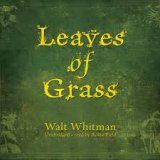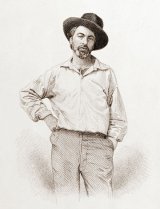Leaves of Grass Page #8
Leaves of Grass is a poetry collection by the American poet Walt Whitman (1819–1892). Although the first edition was published in 1855, Whitman spent most of his professional life writing and re-writing Leaves of Grass, revising it multiple times until his death. This resulted in vastly different editions over four decades—the first, a small book of twelve poems and the last, a compilation of over 400.
Twenty-eight young men and all so friendly; Twenty-eight years of womanly life and all so lonesome. She owns the fine house by the rise of the bank, She hides handsome and richly drest aft the blinds of the window. Which of the young men does she like the best? Ah the homeliest of them is beautiful to her. Where are you off to, lady? for I see you, You splash in the water there, yet stay stock still in your room. Dancing and laughing along the beach came the twenty-ninth bather, The rest did not see her, but she saw them and loved them. The beards of the young men glisten'd with wet, it ran from their long hair, Little streams pass'd all over their bodies. An unseen hand also pass'd over their bodies, It descended tremblingly from their temples and ribs. The young men float on their backs, their white bellies bulge to the sun, they do not ask who seizes fast to them, They do not know who puffs and declines with pendant and bending arch, They do not think whom they souse with spray. 12 The butcher-boy puts off his killing-clothes, or sharpens his knife at the stall in the market, I loiter enjoying his repartee and his shuffle and break-down. Blacksmiths with grimed and hairy chests environ the anvil, Each has his main-sledge, they are all out, there is a great heat in the fire. From the cinder-strew'd threshold I follow their movements, The lithe sheer of their waists plays even with their massive arms, Overhand the hammers swing, overhand so slow, overhand so sure, They do not hasten, each man hits in his place. 13 The negro holds firmly the reins of his four horses, the block swags underneath on its tied-over chain, The negro that drives the long dray of the stone-yard, steady and tall he stands pois'd on one leg on the string-piece, His blue shirt exposes his ample neck and breast and loosens over his hip-band, His glance is calm and commanding, he tosses the slouch of his hat away from his forehead, The sun falls on his crispy hair and mustache, falls on the black of his polish'd and perfect limbs. I behold the picturesque giant and love him, and I do not stop there, I go with the team also. In me the caresser of life wherever moving, backward as well as forward sluing, To niches aside and junior bending, not a person or object missing, Absorbing all to myself and for this song. Oxen that rattle the yoke and chain or halt in the leafy shade, what is that you express in your eyes? It seems to me more than all the print I have read in my life. My tread scares the wood-drake and wood-duck on my distant and day-long ramble, They rise together, they slowly circle around. I believe in those wing'd purposes, And acknowledge red, yellow, white, playing within me, And consider green and violet and the tufted crown intentional, And do not call the tortoise unworthy because she is not something else, And the jay in the woods never studied the gamut, yet trills pretty well to me, And the look of the bay mare shames silliness out of me. 14 The wild gander leads his flock through the cool night, Ya-honk he says, and sounds it down to me like an invitation, The pert may suppose it meaningless, but I listening close, Find its purpose and place up there toward the wintry sky. The sharp-hoof'd moose of the north, the cat on the house-sill, the chickadee, the prairie-dog, The litter of the grunting sow as they tug at her teats, The brood of the turkey-hen and she with her half-spread wings, I see in them and myself the same old law. The press of my foot to the earth springs a hundred affections, They scorn the best I can do to relate them. I am enamour'd of growing out-doors, Of men that live among cattle or taste of the ocean or woods, Of the builders and steerers of ships and the wielders of axes and mauls, and the drivers of horses, I can eat and sleep with them week in and week out. What is commonest, cheapest, nearest, easiest, is Me, Me going in for my chances, spending for vast returns, Adorning myself to bestow myself on the first that will take me, Not asking the sky to come down to my good will, Scattering it freely forever. 15 The pure contralto sings in the organ loft, The carpenter dresses his plank, the tongue of his foreplane whistles its wild ascending lisp, The married and unmarried children ride home to their Thanksgiving dinner, The pilot seizes the king-pin, he heaves down with a strong arm, The mate stands braced in the whale-boat, lance and harpoon are ready, The duck-shooter walks by silent and cautious stretches, The deacons are ordain'd with cross'd hands at the altar, The spinning-girl retreats and advances to the hum of the big wheel, The farmer stops by the bars as he walks on a First-day loafe and looks at the oats and rye, The lunatic is carried at last to the asylum a confirm'd case, (He will never sleep any more as he did in the cot in his mother's bed-room;) The jour printer with gray head and gaunt jaws works at his case, He turns his quid of tobacco while his eyes blurr with the manuscript; The malform'd limbs are tied to the surgeon's table, What is removed drops horribly in a pail; The quadroon girl is sold at the auction-stand, the drunkard nods by the bar-room stove, The machinist rolls up his sleeves, the policeman travels his beat, the gate-keeper marks who pass, The young fellow drives the express-wagon, (I love him, though I do not know him;) The half-breed straps on his light boots to compete in the race, The western turkey-shooting draws old and young, some lean on their rifles, some sit on logs, Out from the crowd steps the marksman, takes his position, levels his piece; The groups of newly-come immigrants cover the wharf or levee, As the woolly-pates hoe in the sugar-field, the overseer views them from his saddle, The bugle calls in the ball-room, the gentlemen run for their partners, the dancers bow to each other, The youth lies awake in the cedar-roof'd garret and harks to the musical rain, The Wolverine sets traps on the creek that helps fill the Huron, The squaw wrapt in her yellow-hemm'd cloth is offering moccasins and bead-bags for sale, The connoisseur peers along the exhibition-gallery with half-shut eyes bent sideways, As the deck-hands make fast the steamboat the plank is thrown for the shore-going passengers, The young sister holds out the skein while the elder sister winds it off in a ball, and stops now and then for the knots, The one-year wife is recovering and happy having a week ago borne her first child, The clean-hair'd Yankee girl works with her sewing-machine or in the factory or mill, The paving-man leans on his two-handed rammer, the reporter's lead
Translation
Translate and read this book in other languages:
Select another language:
- - Select -
- 简体中文 (Chinese - Simplified)
- 繁體中文 (Chinese - Traditional)
- Español (Spanish)
- Esperanto (Esperanto)
- 日本語 (Japanese)
- Português (Portuguese)
- Deutsch (German)
- العربية (Arabic)
- Français (French)
- Русский (Russian)
- ಕನ್ನಡ (Kannada)
- 한국어 (Korean)
- עברית (Hebrew)
- Gaeilge (Irish)
- Українська (Ukrainian)
- اردو (Urdu)
- Magyar (Hungarian)
- मानक हिन्दी (Hindi)
- Indonesia (Indonesian)
- Italiano (Italian)
- தமிழ் (Tamil)
- Türkçe (Turkish)
- తెలుగు (Telugu)
- ภาษาไทย (Thai)
- Tiếng Việt (Vietnamese)
- Čeština (Czech)
- Polski (Polish)
- Bahasa Indonesia (Indonesian)
- Românește (Romanian)
- Nederlands (Dutch)
- Ελληνικά (Greek)
- Latinum (Latin)
- Svenska (Swedish)
- Dansk (Danish)
- Suomi (Finnish)
- فارسی (Persian)
- ייִדיש (Yiddish)
- հայերեն (Armenian)
- Norsk (Norwegian)
- English (English)
Citation
Use the citation below to add this book to your bibliography:
Style:MLAChicagoAPA
"Leaves of Grass Books." Literature.com. STANDS4 LLC, 2024. Web. 23 Dec. 2024. <https://www.literature.com/book/leaves_of_grass_23>.




Discuss this Leaves of Grass book with the community:
Report Comment
We're doing our best to make sure our content is useful, accurate and safe.
If by any chance you spot an inappropriate comment while navigating through our website please use this form to let us know, and we'll take care of it shortly.
Attachment
You need to be logged in to favorite.
Log In